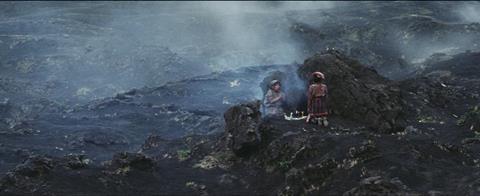Jayro Bustamante discusses his Guatemalan story sold by Film Factory.

Berlin competition entry Ixcanul (Volcano) charts the haunting story of a 17-year-old Mayan woman who lives on the slopes of an active volcano in Guatemala but dreams of seeing ‘the city’.
However, her status as an indigenous woman does not allow her to go out into that ‘modern world’. Later, during a pregnancy complication, this modern world will save her life, but at a price.
For 37-year old Guatemalan director Jayro Bustamante his debut feature is very much a personal story.
“I grew up in a Mayan community in a village that was 80 percent Mayan, 20 percent ‘mixed’”, he says.
“My mother was a doctor. She met a woman who told her the story I tell in the film. I wrote it down at the time but had to wait a while before coming to the screenplay. It’s not always easy talking about Mayans as a ‘white’ man in Guatemala.”
“Either way, I wanted to shed light on the experience of Indian women who live in a country where the majority is discriminated against. Usually it’s the minority that is discriminated against.”
The film’s cast is made up of non-professional actors. Finding his lead was particularly challenging in a country with virtually no film infrastructure:
“Maria was very difficult to find. I took a stall in a marketplace and put up a poster saying ‘looking for an actress for casting in a film’ but no-one came. So I changed the poster to say: ‘looking for workers’. Then I had a queue. Maria Mercedes Croy was the very last person to come. She was very timid.”
In light of her shyness and the sparsity of dialogue in the script, physicality became even more important.
“The eyes were so important for this character. There isn’t a lot of dialogue but she was always looking into my eyes and the eyes were a large part of the reason she became my Maria”.
The eruption of the active volcano posed another significant challenge:
“We shot the eruption but decided to cut it out of the final picture because it didn’t fit with our story and we didn’t want it to become a distraction for the audience. Maria is the one I wanted to erupt, as it were, not the volcano.”
While film infrastructure remains virtually non-existent in Guatemala, Bustamante is one of a number of young Guatemalan directors emerging to the international market:
“There is a new wave of young directors from Guatemala,” he explains. “Directors such as Julio Hernandez and Cesar Diaz are part of the movement. I was one of the last ones in this wave because I went to study in Europe.”
Bustamante next wants to return to Guatemala to make a film about the ‘mixed’ community:
“I want to make a film about the relationship between father and son, rather than mother and daughter, as in Ixcanul. It will be a more modern, comfortable Guatemala than that of Ixcanul but will also reveal underlying chaos.”
The director intends to reteam with his Ixcanul team including producer Pilar Peredo and DoP Luis Armando Arteaga.

















![[L-R]: Amanda Villavieja, Laia Casanovas, Yasmina Praderas](https://d1nslcd7m2225b.cloudfront.net/Pictures/274x183/6/4/1/1471641_pxl_20251224_103354743_618426_crop.jpg)




No comments yet